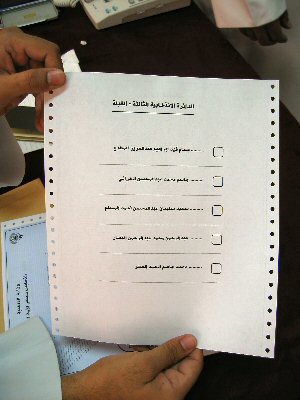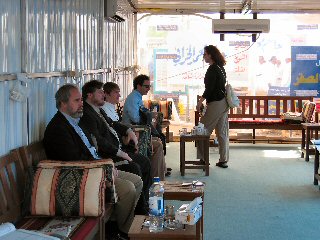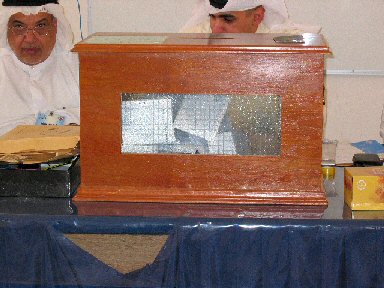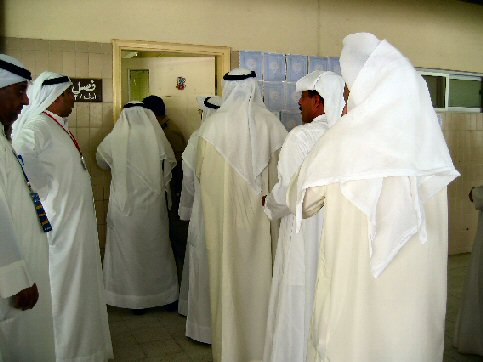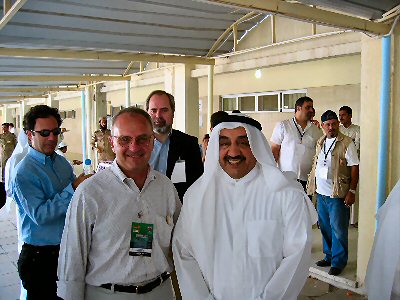Chapter 4: Voting Day
Kuwait has a long history of Parliamentary elections. From the time it became independent from Great Britain in 1961 until the elections last week they have been held more-or-less every four years.
The Parliament in Kuwait is not a co-equal branch of the government as it is in the US. It is a decidedly unequal - and in second place - to the Emir and the Emir's Council of Ministers.
Nevertheless, the notion of having any form of a democratically elected assembly in the Gulf region has long been seen as a net positive.
As I have reported before, women can't vote.
Don't start. Women should be allowed to vote, and you know it. Well, maybe not all women. Barbra Streisand should be barred from voting until she buys that middle "A."
The elections were on a Saturday. Notwithstanding e-mails from noted former members of the military about whom very excellent movies have been made starring Robin Williams, Thursday in the Middle East is like our Saturday; Friday is the Sabbath, like our Sunday.
Two or three lives ago, when I worked for the Information Technology giant, Electronic Data Systems, I more-or-less owned the Middle East.
Here's the background on that which, might be fairly boring for every living thing on the planet, so I'll do it as a sidebar.
SIDEBAR:
I was sitting in the First Family skybox in the Astrodome with a friend of mine from Dallas and I decided - there and then - that I was done with politics.
I wasn't quite yet. I finished out the cycle in Missouri, but I needed a break.
The Mullings Director of Standards & Practices had worked for EDS from the time we had moved to Washington, DC - and from the time that Ross Perot still owned the company. But this time he had sold it to General Motors.
In 1991 she was transferred to Dallas and I, being a man of the 90's, happily moved with the Lad to the first place I had ever lived where the weather forecasters on TV said things like, "The high today will be 101, the normal high for this date is 103." It was also the first place I had ever lived where there was a section in the classifieds for "Cattle and Livestock."
Because of the MD of S&P's excellent contacts in EDS, I got a job right after the November elections. What with this and that, and one thing and another, I ended up being the company's expert on the Middle East.
You might remember the story of EDS in Iran: Ross Perot hired a private army to get them out. And get them out, he did. They escaped from jail during a Perot-paid-for prison-riot, then overland to Turkey where a chartered 707 waited to whisk them back to the West.
This was a highly publicized deal at the time - 1978 and '79. It produced a major book written by Ken Follett, "On Wings of Eagles." as well as mini-series, movies, plays, board games and musicals.
Anyway, this was now 1994 and no EDS employee had been back to the region in any meaningful way since that time.
When I was leaving to visit Bahrain for the first time, a senior VP reminded me that Perot was no longer at EDS and if I got my butt thrown into jail it was unlikely anyone would be coming to get me. Good joke.
At various times over the next three years we had operations in Bahrain (where we established our headquarters) , the UAE, Oman, Qatar, Israel (where we established the non-Arab headquarters) and Egypt. I had been to Kuwait twice to talk about potential business which had not come to fruition prior to my returning to Washington to work (again) for Newt in January 1996.
So, this trip was not my first to the region. END SIDEBAR
But it was my first time back since those days, and I was looking forward to it. Even without my luggage (which, by the way, still hasn't appeared even though I have been back in the US since Monday afternoon and, therefore, haven't seen it for 11 days).
One of the dangers of being an observer of something like the Kuwaiti elections is the urge to think that, because you have been on the ground for 72 hours, you understand what you are looking at.
This is a problem when from Washington, DC to someplace like Denver where everyone speaks the same language. When you go to someplace where English is not the first language - like Louisiana - then you are very, very thin ice.
If the place you are going has temps in the 120's then there is no ice at all.
So, with that as a cautionary note, here's the quick background.
The Parliament is generally anti-government. It is useful to remember that the word "government" is used here more like it is used in Britain than it is in the US.
In Britain whichever political party wins the most seats in Parliament gets to "form a government." In the US "the government" includes the legislature.
Are we clear on this? Because it's important.
The Kuwaiti Parliament is largely an anti-government body.
Another nuance. Being anti-government does not mean being anti-Emir. Very few people are anti-Emir. I tried to come up with a metaphor for this dichotomy, but I can't. Perhaps if I were Catholic I might be opposed to some of the teachings of the Church but I might not attach those feelings to the Pope.
The business about how people think about the Emir is very real. It is grounded in the law - the editor-in-chief of one of the largest newspapers in Kuwait was arrested a couple of weeks before the election for speaking ill of the Emir.
I met with that guy and even with a criminal case pending against him, he made a point to say he was speaking about the Royal family; that he could nor would ever say anything against the Emir.
As voting is limited to males over 21; and as all males over 21 dress exactly alike, you end up with scenes like this at political rallies:
This happened to have been at the rally of a major Islamic candidate. The Islamicists actually picked up a couple of seats in the 50-seat body at the expense of the "liberals" who are down to one or two seats. The other major group (there are no political parties in Kuwait) are the "Tribalists."
This is another term which was difficult to get my arms around. The Tribalists are not a bunch of people sleeping in tents and riding on camels. They are sleeping in very large houses and riding in Mercedes sedans. But they are the traditionalists and are, the group most loyal to the Royal family.
The rally depicted above was typical of the end-of-the-campaign activities of most of the major candidates. The audience is sitting in a large, air-conditioned tent. Outside was seating for about that many people again:
The people outside had a large TV to be able to watch the activity as well as a speaker system to hear what was going on.
A large buffet was located behind the tent in an area that was well-guarded to prevent people from feeding prior to the end of the speeches.
Very wise.
Unlike US rallies there were no balloons, no music, no chanting, no applause at any time during the speeches, and … no women.
Another change from a typical US rally was the candidate spoke from a table at the front of the room sitting down with his campaign manager (who had introduced him) sitting next to him.
Here's what it looked like:
The candidate is the guy on the left. When he started, I said to one of the group "He'll go 35 minutes." At just about the 35 minute mark, when he was showing no signs of slowing down, the campaign manager leaned over and handed him a note which probably said "Finish up, oil-gusher-mouth" because the candidate flipped through about 10 pages of his legal pad and still went for another seven minutes.
Nevertheless he won, I believe, a third term, the next day.
I mentioned there are 50 members of the Parliament; there are 25 districts to each district elects two people. Two men.
There are a couple of ways to approach this if you are a candidate.
First of all, the total electorate is about 130,000. The districts are not drawn equally, but for the sake of this discussion, let's pretend they are.
130,000 divided by 50 = 2,600. There are 2,600 voters in each district. Each voter can - CAN - vote for two people.
For someone like the guy who's rally I went to, his strategy would be to run strong, and come in first. I would, in fact, convince my supporters to forego their second vote and only vote for me. That, in the business, is called "single-shotting."
If I were another candidate in the same district, however, I want the voters to use their second vote. Remember, I don't have to win. I just have to do better than third.
I would do one of three things:
(2) I would tell the voters - whether the front-runner wanted me to do this or not - that they should use their second vote for me because I'll be their favorite guy's ally on all pieces of major legislation; or,
(3) I would tell the voters that if they don't like the front-runner then I am the only person in the field (I think in this district there were eight candidates) who can speak for those who don't like the guy and see if I could cobble together 17 or 18 hundred votes that way. There is a fourth approach which, according to almost everyone we spoke to occurs more than anyone would like to publicly admit, and that is to simply pay people to vote for you.
One guy actually advertised in the newspaper that he wanted to hire 1,500 people to do publicity for him in the campaign - at about 1,000 Kuwaiti Dinars each - about $3,250. This is about a $5 million investment.
Not only that, but he promised them ANOTHER 1,000 KDs if he won!
This was too much for the government and they forced him to withdraw from the race.
On election day - that was the day which was 50° C - we went to a couple of polling places to see how it worked. Most of the voting is done, as it is here, in local schools.
As part of the attempt to discourage vote-buying, cell phones are forbidden in the room where you actually cast your ballot. This is a new development since the advent of digital cameras as a part of a cell phone. People had been told to take their cell phone in with them, and photograph the ballot after they had marked it to prove they had voted for the guy who had paid them.
Here is what a ballot looked like:
That editor I wrote about? The guy who was arrested? The night I went to visit with him he was on the phone with the Minister of the Interior. It seems the paper had heard of vote buying going on, so he had sent a photographer to capture the moment.
The photographer was arrested and his camera was confiscated.
He told me that he was trying to get his camera back as it had cost the paper 1,000 KDs.
"What about the photographer?" I asked.
"I can get another photographer. I can't afford to lose another camera."
As it turned out he was kidding.
He said.
People were treated to sandwiches, cold drinks and air-conditioned plastic tents such as the one in which we took refuge:
People waited in line outside the room in which the actual voting took place.
Inside there were poll watchers who kept track of who had voted and who hadn't. We do that here, as well.
This is the group of turnout trackers in one location:
They watched people put their paper ballot into a box such as this:
Outside one of the polling places I asked the guy dressed in white how he was going to vote:
A sad note. Outside one polling place I was introduced to the Speaker of the House.
Given my history with Speakers of the House, he will probably be able to mark the beginning of the end of his career from the moment this photo was taken.
Next: Wrapping it all up and coming home.
Click here to return to the Secret Decoder Ring page
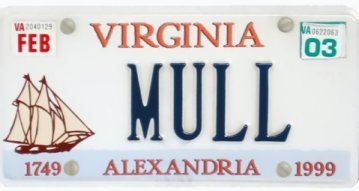

Kuwait Here. I'll Be Right Back
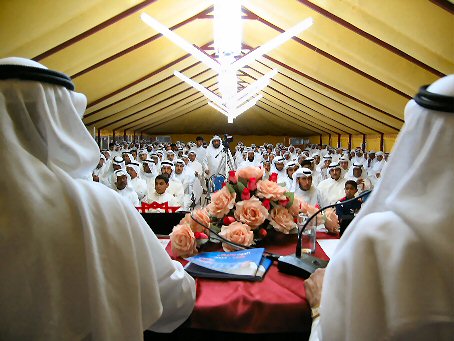
It was at the 1992 Republican National Convention in Houston. It was specifically at the moment that Patrick Buchanan - who had been a thorn in the side of President H.W. Bush throughout the campaign - was speaking to the Convention delegates. This was the speech which Liberal columnist Molly Ivins described as "sounding better in the original German."
 EDS had a contract, as I remember, to update the technology surrounding Iran's social security system. When the Shah was overthrown by the Ayatollah, the new government wanted to insure that EDS finished the work so, in that highly subtle and nuanced manner which has defined the Iranian government since the fall of the Shah, they threw the two top EDS guys - Paul Chiapparone and Bill Gaylord - into jail as hostages to the work.
EDS had a contract, as I remember, to update the technology surrounding Iran's social security system. When the Shah was overthrown by the Ayatollah, the new government wanted to insure that EDS finished the work so, in that highly subtle and nuanced manner which has defined the Iranian government since the fall of the Shah, they threw the two top EDS guys - Paul Chiapparone and Bill Gaylord - into jail as hostages to the work.
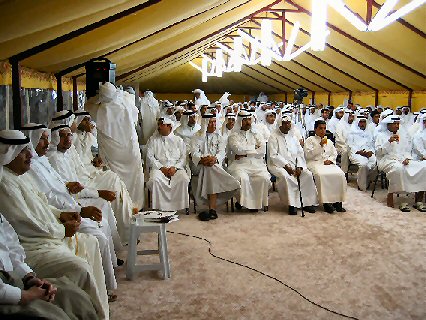
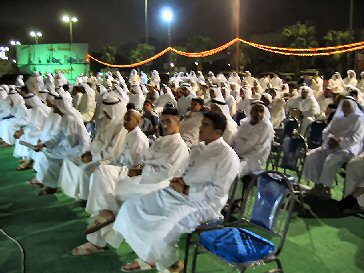
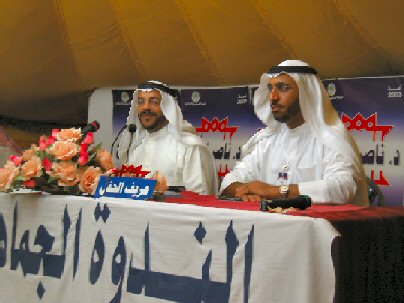
(1) I would try to convince the front-runner to tell his supporters to use their second vote for me. In return I would pledge to be his ally on all major pieces of legislation.
